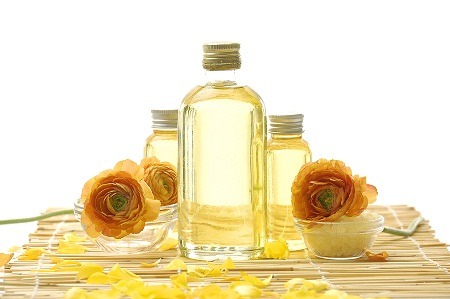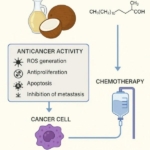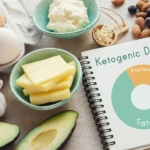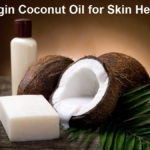
Virgin Coconut Oil is becoming a favorite in spa treatments for skin health
by Brian Shilhavy
Editor, Health Impact News
In addition to ingesting the coconut oil, I just have to tell you about another exciting way that coconut oil has helped me! I use it on my face and I can’t believe how much it has helped. I used to spend hundreds of dollars on face creams. I won’t waste my money on those empty promises again. I look ten years younger! Honestly!
My pores are smaller, and my skin tone is much more even. I used to have breakouts once in awhile. Not any more thanks to coconut oil. Next March I will be 40 years old and with the help of coconut oil I will not only reach my weight loss/health goal, my face will look younger too! Kelly – Lander, WY
Filipinos are well-known for their youthful appearance and soft, wrinkle-free skin, even though they live in a climate that exposes them to the sun’s rays year round.
Skin cancer is basically unknown in the Philippines, even with all of their exposure to the tropical sun. Since coconut oil is their main dietary oil, and is also the main ingredient in their skin care products, one must take a closer look at how Virgin Coconut Oil provides skin health.
Coconut oil’s ability to nourish and heal the skin has been known in the tropics for hundreds of years. Even when the anti-saturated fat campaign waged in the US convinced many even in coconut oil producing countries to switch to polyunsaturated oils, Filipinos and others never stopped using coconut oil on their skin because they knew about its wonderful moisturizing and healing powers for generations.
As a saturated fat consisting primarily of medium chain fatty acids (MCTs), it is not easily oxidized and does not cause harmful free radical damage like polyunsaturated vegetable oils.
Most commercial skin care products in the US today are made from polyunsaturated oils which oxidize and turn rancid very quickly causing free radical damage in the skin. There is good evidence that this is not only true for external applications, but also holds true for the oils one consumes.
One of the main reasons that we experience so many skin problems in the US today is a switch in our dietary oil. Our forefathers consumed primarily saturated fats, but most people today consume polyunsaturated fats and trans fatty acids.
I wanted to share my experience with virgin coconut oil. I have been using the oil for about two weeks. My skin looks great, no more dryness-I use to have very dry skin. My hair looks great, soft and shiny, no more frizz. And my scalp is no longer dry. Also, my eyelashes have grown longer and thicker! This is a plus I did not expect. I now make an effort to apply a bit of oil with a clean mascara brush each morning/night. Lizmarie (Coconut Diet Forums)
Coconut Oil Offers Hope for Fungal Skin Problems
Virgin Coconut Oil has been reported to help many skin problems as well. Depending on what is causing the skin problem, the coconut oil seems to work in a variety of ways.
For example, we have had positive reports from people who suffer from yeast infections in the skin, and there is solid research that shows the MCTs in coconut oil do kill yeast infections (see our article on Candida.)
Here are some of the testimonials we have received regarding coconut oil helping with fungal skin problems:
I started on coconut oil 3 weeks ago. I am a large person, hoping that the Virgin Coconut Oil (VCO) will speed up my sluggish thyroid. As a large person I have skin folds and I often suffere(d) from fungal/yeast infections that made me very sore. The only remedy that I found in the past that worked was an ingested dose of a proprietary remedy for “Thrush”. This was both expensive and only ever a partial solution. After taking the VCO for, as I said, 3 weeks all my skin fold problems have disappeared. It is wonderful to be clear of them and this current very hot humid weather that we have recently had was a real test for this. Liz (Coconut Diet Forums)
You’re right Liz, I deal with this same stubborn yeast/fungal thing, especially in the summertime. While waiting for my second order, I’ve been reading the research reports on the Tropical Traditions website and the archives over and over as if just knowing the information would help me with my own physical problems. But this week, I am a believer from experience!
One of the big problems with skin yeast and fungal infections is that clothing tends to rub absorb or else rub off the expensive medicine after application. This time, I wasn’t looking forward to applying the strong liquid prescription to it because the kind I have stings–big time–when it hits the red, angry, sore area of the yeast infection in the skin folds. I had some VCO left in a small jar which I was using for smoothing on after a shower. I took that out and just slathered it on. Instantly the pain was soothed away, and for the moment anyway, that was enough. By the end of the day, I could tell that the coconut oil was doing more than just relieving the soreness–the rash was breaking up a little, and there were some small clear areas where before it was just solid red soreness. I applied the coconut oil twice a day, and in three-four days, the whole area is mostly pink and clearing. And it isn’t staining clothing, either!
I am marveling over and over about how this coconut oil is working!!! I’ve been poring over the archived information. By the time I finished my first quart of VCO I could tell my hypoglycemic hunger cravings were subsiding, and my taste for coffee and chocolate was changing. Anything more I could say would just be like a lot of exclamation points, and I’ve been told that isn’t very polite! So just “thank you, thank you, Tropical Traditions.” Beverly ( in response to Liz in the Coconut Diet Forums)
When my baby boy, David, was 10 weeks old he had a yeast infection on his bottom. Instead of running to the Dr. to get an expensive prescription, I first tried VCO. I was very new to using it so I wasn’t sure what to expect. I liberally applied coconut oil at each diaper change (about 6x/day) allowing it to soak in for a few minutes after each application. I was astounded that within 24 hours there was significant improvement. I continue to apply it and within 3 days the yeast infection was completely gone. VCO is awesome!! Vanessa – Gilbert, IA
I am a 35-year-old female who had red lesions on my face for many years. Unbelievably it finally cleared in three months when I applied Coconut Oil topically to my face each day.
I had been going to a dermatologist for 12 years with minimal results. I had lesions, which were red, and resembled acne. Ironically antibiotics made it worse, yet the doctor kept prescribing them for me. I had used six different topicals for acne, which usually ended up hurting my face. The doctor kept saying “give it a chance it will get worse before getting better.” I couldn’t understand why I had acne since my skin was so dry, itchy and flaky. The retinols were the worst on my skin, followed by the salicylic acid, the glycol’s and then the benzyl peroxides.
Frustrated I then became a nutritional purist for five years and still no clearing. I started using natural remedies, homeopathic, herbals and super foods to change my skin condition. I had already eliminated hydrogenated oils from my diet, so I decided to try to incorporate coconut oil into my diet. I really wasn’t consistent about eating the coconut oil, but I was faithful about applying it to my face each night. I had nothing to loose by giving it a try. My theory on why it might work was due to the fact that the sebum in the skin breaks down the medium chain triglycerides into smaller fatty acids which have antibacterial and anti-fungal activities.
My dermatologist had tried for 12 years to dry up the sebum and kill the bacteria causing the acne, so I decided to go a different route by using the sebum constructively instead of trying to eliminate it. My face cleared and I was so excited that I [went] to my dermatologist and told her about my success. The doctor belittled the theory, saying that I had just grown out of it. [She said that] most likely my hormones had stabilized and that my face clearing at the same time I used the coconut oil was just a coincidence.
Since I believed in my doctor’s medical knowledge, I started to doubt my discovery. So to test my theory, I stopped using the coconut oil on my face, and as well I didn’t go out of my way to eat it either. Additionally, I still avoided hydrogenated oils.
Six months later I had a follow up appointment with that dermatologist and my face was as bad as it had always been. The doctor snidely asked if I was still using that coconut oil because “that heavy oil” had clogged up all my pores. I replied that I had stopped using the oil after our last appointment. However, I intended to use the coconut oil again to see if my theory was right. Unexpectedly the doctor offered to order blood-work to check my hormones at the beginning and again at the end of my trial; I agreed to the testing. My blood-work showed most of my hormones as normal with the testosterone as a little high. I used the coconut oil on my face every night faithfully; and in three months at my next appointment my face had cleared again with almost no scarring. The doctor ran the follow up blood-work and surprisingly my testosterone level had increased. Too much testosterone has been proven to increase acne. The doctor was surprised but wasn’t ready to rule out other factors. She then wanted to do more testing including allergy testing and skin scrapings. This meant that I would have to stop using the oil for some of the testing. I hated the thought of loosing that great confident feeling and freedom I got from having a clear face, but I agreed to the testing anyway.
The doctor tested for different yeast, fungus, ringworm, bacteria, allergens, and Demodex and Scabies mites. I didn’t test positive for any of the allergens either time. When not using the coconut oil, my skin scrapings had increase numbers of Demodex in my sebaceous glands as well as in my hair follicles but there were no Scabies. There were minimal increases in bacteria and the yeast Candidia, but there was a marked increase in the fungus Malassezia Furfur, but not ringworm. This clearly explained why the antibiotics made things worse; I didn’t have acne. Any bacteria was secondary, the main culprit was the fungus Malassezia Furfur which caused a condition called Pityrosporum Folliculitis. Using antibiotic reduced the bad as well as the good bacteria allowing the fungus to grow unchallenged. Additionally, although the Demodex mite lives in everyone’s skin in small numbers, they multiply greatly in immune deficient host and they thrive on yeast in the body.
Since my experiment was intended to use the excess sebum that is present with acne to combine with the coconut oil to fight the bacteria that causes the acne, I failed to prove my hypothesis because my condition was misdiagnosed as acne and I don’t have excess sebum. Hopefully someone reading this with confirmed excess sebum and acne would complete the experiment for me. However though, I do believe my theory was mostly right in that the coconut oil mixes with sebum in the skin which breaks the oil down into the healing fatty acids. In my case it just happened to be the anti-fungal activity of the fatty acids that cleared my skin. By eliminating the yeast, many of the mites starved. As my face healed and the irritation was less, the occurrence bacterial infections decreased.
I truly believe if I stop using coconut oil on my face the fungus will grow out of control and the whole cycle would begin resulting in the lesions I had been plagued with for over a decade. I am now trying to eat coconut oil every day in order to correct the underlying cause that makes me an ideal host for the Malassezia Furfur fungus. Tammy – Salisbury, MD
Coconut Oil for Acne
Yes, coconut oil is great for getting rid of both dry skin and pimples. I have had combination skin for years; but almost immediately, I saw my face free from pimples and free from dry areas. In fact, I had a flaky, itchy patch of skin just below my eyebrow that disappeared and has not returned, since regularly using coconut oil on my face — which has been just over a month now. I put in on before bed, without first washing my face; then I wash it off in the morning.
From what I understand, the medium chain triglycerides break down into the useful antimicrobial free fatty acids because of the affects of bacteria on the skin. So I decided to start using the oil on my unwashed face instead of a newly cleansed face, which would have less bacteria and therefore (I assume) a slower breakdown of the oil into fatty acids. My skin looks great, smooth and healthy. And it’s definitely softer than it used to be, too. Melinda
My son really did not want to use it, but his Benzemyacin was really not working very well…and the retin A just brutally destroyed his skin (painfully red and dry and cracked) so he used his neutrogena face wash and then applied the oil, it takes a little while to soak in, but by the next morning his red skin from the retin A was gone, his face was white again…
He uses more at night when no one sees him, and less in the morning before he goes to school…when he gets home from school, he would dab a little just on the spots that are worse…I have used it, and I was afraid at first cause the thought of oil on your face is the opposite of what we are taught about getting rid of pimples. But I just tried it on a few blemishes, and they were gone the next day…it was amazing. I now use it all over my face! My son’s acne is under control now, he has some problem areas, but they are slowly getting better. Robin (Coconut Diet Forums)
Coconut Oil for Skin Problems: Eczema, Keratosis Polaris, Psoriasis, & Rosacea
We have been using the coconut oil in more ways than I had imagined we would! I use it as a facial moisturizer, and I prefer it to the expensive lotion that I have used for years. Several people have even commented on my skin! Probably the most dramatic result we have gotten with the coconut oil is with my 20 month old son. He has had eczema on his legs and arms for a long time, and nothing seemed to help it. I even tried costly lotion just for that purpose and it seemed to make the dry, scaly patches worse! Many people noticed it, and I just didn’t know what to do.
Well, I began putting the coconut oil on his skin nightly and there has been HUGE improvement!! The big, rough, red patches are gone and there is just the tiniest hint of a rough feeling in places, and only when I slack off and don’t use it for a while. We do eat the coconut oil, by the way, and have enjoyed it very much (especially the almond bark recipe on your site-yum) but I wanted you to know how much it had helped us in ways that people may not realize it would. THANK YOU, Louise – South Carolina
I was fortunate to have found the miracle coconut oil. For years I suffered with a skin condition called keratosis polaris(bumpy, itchy skin). I tried many, many treatments and spent hundreds of dollars on creams and cleansers. Nothing worked, until Tropical Traditions Coconut Oil. I have been using the oil for cooking and as a body cream. My skin condition is 100% improved. The products are very inexpensive compared to the cost of most of the useless products I tried in the past. Thank you for this miracle product! Janet – Elizabeth, NJ
Last year I stared noticing embarrassing little red scaly itchy patches of skin on my hands. I tried just about every lotion for dry and sensitive skin on the Wal-Mart shelf, and got very few results. I made an appointment with my doctor and she diagnosed me with psoriasis. She sent me to the pharmacy with a prescription for a psoriasis cream and a lotion and instructed me to use them everyday. The lotion and cream stung so bad, it was worse then the itchy skin I had been dealing with for months. By this time I had big patches on my hands, few on my neck, and on my eyelids.
I was getting desperate because people were starting to notice more and more my red flaky skin. While doing some research for a natural solution online, I read about coconut oil. I don’t see anything specific about helping to alleviate the dry skin of psoriasis, but it did say it was an excellent skin moisturizer so I thought I would give it a try. The day I got it I started adding a little to just about everything I ate.
I ended up incorporating about 2-3 tablespoons a day into my food, and using it as a moisturizer on my psoriasis patches as well as the rest of my body. In no time at all my psoriasis was gone. As an added bonus my splotchy complexion started evening out, my skin has never been softer, and my body temperature rose to the level where I was no longer cold all the time. I am very grateful I found this perfect coconut oil; it has made a huge difference in the way my skin looks and feels. I am now a lifetime customer of Tropical Traditions Virgin Coconut Oil. Ashley – La Cygne, KS
I have been using the coconut oil for 2 weeks, 3 times a day on my elbows and knee since they have psoriasis. It’s unbelievable how this has helped my skin and I’m almost there to having normal elbows again!! I have suffered with the “heartbreak of psoriasis” for 40 yrs. and tried numerous products.
Of course, nothing helped and they were not natural products, there were always side-effects. It started in high school and I am in my 50′s now. Wow!! I’ve been a Christian for many years and at church today told a friend and she is telling her employer, a dermatologist. Believe me, I will be telling everybody and showing them the proof. What an answer to prayer!!!!!! I’m just overwhelmed!! Ruth – Mesa, AZ
Dear Tropical Traditions, I love your Virgin Coconut Oil! I started using it on my skin and in my diet after reading about its healing powers. I am a licensed esthetician and have been working with many clients with rosacea. Nothing was working. A few of my clients even tried prescription medication and expensive laser treatments.
As an skin care specialist, I am used to using multiple products on my skin and on my clients, yet I transitioned to only using a mild cleanser and virgin coconut oil on my self. I decided to experiment on my clients. During a skin care treatment on my client with tenacious rosacea, I applied coconut oil and let it absorb for about 15 minutes. I could see results instantly. My client was very pleased and has continued to see more improvement! I look forward to receiving your product so I can have it available to my clients to use everyday. Who would of thought it could be that simple? Leslie Licensed Esthetician
Coconut Oil Sun Protection
One of the most interesting facts about people who live in tropical climates like the Philippines, where the people are constantly exposed to the rays of the sun year round, is that skin cancer is almost unheard of in these places. Here in the US we are constantly warned about the dangers of exposure to the sun, and yet the sun helps our bodies produce much needed nutrients for our skin, such as Vitamin D, which has been shown to prevent cancer.2
Once again we see that coconut oil is probably one of the main reasons people in tropical climates can spend so much time in the sun and not suffer from skin cancer. Coconut oil has wonderful antioxidant properties that protect the skin from free radical damage. Also, when coconut oil is consumed and used topically on our skin, it helps our bodies absorb other nutrients more effectively as well, such as Vitamin E, another powerful antioxidant nutrient that protects the skin.
I am fair skinned but used VCO as a sunscreen in Florida last summer. My family thought I was crazy. I did not burn although everyone else did (with their toxic sunscreen). One day, I did get a little too much sun, and was a little red, but I put the VCO on it and it was gone by the next day. So try it, and see, just be sensible about the sun, nothing can protect you if you stand in the hot sun for a very long time. Rachel (Coconut Diet Forums)
I just got back from my 7-day trip to Jamaica. I used VCO exclusively as my sunscreen. I had no burns and my tan is even and golden. I am somewhat fair-skinned. Most of my time was spent in the shade, but I spent a good amount of time floating around on the water each day. My husband is even fairer and he did get pink slightly on his shoulders, at which time he applied both sunscreen and VCO to that area (VCO everywhere else). His tan is also pretty dark. People kept commenting on what nice color we were getting, ha ha. Marnie (Coconut Diet Forums)
It should be noted that when reports like this are made in our discussion group, invariably some will try using Virgin Coconut Oil exclusively as a sunscreen and go out and get burned!
Some have even reported that sometimes the coconut oil works wonderfully as a sunscreen, while at other times they seem to get burned.
It seems that the oils you put into your body are just as important as what you onto your body in regards to sun protection.
We have found that if one eats foods loaded with polyunsaturated oils, generally they will burn more in the sun.
It is theorized that when one eats foods cooked in polyunsaturated vegetable oils, often with trans fatty acids, that one is putting oxidized lipids into their skin tissue that are causing free radical damage, and more susceptible to burning in the sun.
So if you just got done eating some french fries from a fast food restaurant, you may be more susceptible to sun burn!
Coconut Oil Under Arm Protection!
Another amazing result many are reporting from Virgin Coconut Oil is using it directly under their arms as a deodorant! Many have theorized that the MCTs in the oil attack the bacteria in sweat that cause the odors.
I have been using straight VCO as an underarm deodorant since last fall. Works wonders. Works just as good as any antiperspirant deodorant I have ever used: you just don’t have the fragrance from regular deodorant. I have a job that requires a lot of manual labor and my VCO deodorant has not failed me yet, even when over heated. Abigail (Coconut Diet Forums)
I used some VCO on a paper towel and put under my arms. It is like magic! No smell, no sweat, awesome!!!!!!! I just got back from biking and not a drop of sweat under my arms! Jackie (Coconut Diet Forums)
Research on Coconut Oil and Skin Health
Because coconut oil is a food and a natural product, there are not many incentives for people to spend money researching how it works topically on skin. But we have come across some research.
A study was conducted in 2008 at the Skin and Cancer Foundation in the Philippines, entitled: Novel antibacterial and emollient effects of coconut and virgin olive oils in adult atopic dermatitis.
The results were published in the journal Dermatitis.
The study compared virgin coconut oil and virgin olive oil in moisturizing dryness and removing Staphylococcus aureus from colonized Atopic dermatitis skin. It was a double-blind controlled trial in two outpatient dermatology clinics with adult Atopic dermatitis patients who were diagnosed by history, pattern, evolution, and skin lesions.
The study concluded that coconut oil was more effective than olive oil, probably due to the presence of lauric acid which is known to kill bacteria and fungi.1
In 2009 a study was conducted in the Division of Dermatology, Department of Medicine, University of California, San Diego and published in the Journal of Investigative Dermatology.
The title is Antimicrobial property of lauric acid against Propionibacterium acnes: its therapeutic potential for inflammatory acne vulgaris. The abstract states:
The strong bactericidal properties of lauric acid (C12:0), a middle chain-free fatty acid commonly found in natural products, have been shown in a number of studies.
However, it has not been demonstrated whether lauric acid can be used for acne treatment as a natural antibiotic against Propionibacterium acnes (P. acnes), which promotes follicular inflammation (inflammatory acne).
This study evaluated the antimicrobial property of lauric acid against P. acnes both in vitro and in vivo. Incubation of the skin bacteria P. acnes, Staphylococcus aureus (S. aureus), and Staphylococcus epidermidis (S. epidermidis) with lauric acid yielded minimal inhibitory concentration (MIC) values against the bacterial growth over 15 times lower than those of benzoyl peroxide (BPO).
The lower MIC values of lauric acid indicate stronger antimicrobial properties than that of BPO. The detected values of half maximal effective concentration (EC(50)) of lauric acid on P. acnes, S. aureus, and S. epidermidis growth indicate that P. acnes is the most sensitive to lauric acid among these bacteria. In addition, lauric acid did not induce cytotoxicity to human sebocytes.
Notably, both intradermal injection and epicutaneous application of lauric acid effectively decreased the number of P. acnes colonized with mouse ears, thereby relieving P. acnes-induced ear swelling and granulomatous inflammation. The obtained data highlight the potential of using lauric acid as an alternative treatment for antibiotic therapy of acne vulgaris.2
For other studies related to coconut oil and skin health, including how it has been studied in treating wounds and how it is used in India with new born babies in neonatal care, see CoconutOil.com where research is constantly updated.
So before you spend money on expensive skin care products, you might want to consider trying coconut oil for skin health!
About the author: Unlike many people who write about coconut oil by simply reading about it, Brian Shilhavy actually lived in a coconut producing area of the Philippines for several years with his family, observing firsthand the differences between the diet and health of the younger generation and those of his wife’s parents’ generation still consuming a traditional diet. This led to years of studying Philippine nutrition and dietary patterns first hand while living in a rural farming community in the Philippines. Brian is the author of the best-selling book: Virgin Coconut Oil: How it has changed people’s lives and how it can change yours!
Read the Virgin Coconut Oil eBook on Your Mobile Device!
References
1 . Novel antibacterial and emollient effects of coconut and virgin olive oils in adult atopic dermatitis. Dermatitis. 2008 Nov-Dec;19(6):308-15. Verallo-Rowell VM, Dillague KM, Syah-Tjundawan BS. Skin and Cancer Foundation, Pasig, Philippines.
2. Antimicrobial property of lauric acid against Propionibacterium acnes: its therapeutic potential for inflammatory acne vulgaris. J Invest Dermatol. 2009 Oct;129(10):2480-8. Epub 2009 Apr 23. Nakatsuji T, Kao MC, Fang JY, Zouboulis CC, Zhang L, Gallo RL, Huang CM. Division of Dermatology, Department of Medicine, University of California, San Diego, California, USA.




 HHS Secretary Kennedy Breaks His Promise: "War on Saturated Fat" Kept in Tact with New U.S. Dietary Guidelines
HHS Secretary Kennedy Breaks His Promise: "War on Saturated Fat" Kept in Tact with New U.S. Dietary Guidelines Research Continues to Show Virgin Coconut Oil's Effectiveness in Treating Cancer
Research Continues to Show Virgin Coconut Oil's Effectiveness in Treating Cancer Coconut Oil Continues to Benefit Alzheimer's Patients over Drugs as Studies Continue for Neurological Benefits
Coconut Oil Continues to Benefit Alzheimer's Patients over Drugs as Studies Continue for Neurological Benefits How the Simple High-Fat Low-Carb Ketogenic Diet Continues to Change People's Lives
How the Simple High-Fat Low-Carb Ketogenic Diet Continues to Change People's Lives New Studies Continue to Show that Coconut Oil is the Best Oil for Treating Skin Conditions and Maintaining Healthy Skin and Teeth
New Studies Continue to Show that Coconut Oil is the Best Oil for Treating Skin Conditions and Maintaining Healthy Skin and Teeth
31 Comments